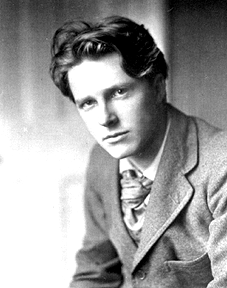|
TIARE TAHITI
Mamua, when our laughter ends,
And hearts and bodies, brown as white,
Are dust about the doors of friends,
Or scent ablowing down the night,
Then, oh! then, the wise agree,
Comes our immortality.
Mamua, there waits a land
Hard for us to understand.
Out of time, beyond the sun,
All are one in Paradise,
You and Pupure are one,
And Tau, and the ungainly wise.
There the Eternals are, and there
The Good, the Lovely, and the True,
And Types, whose earthly copies were
The foolish broken things we knew;
There is the Face, whose ghosts we are;
The real, the never-setting Star;
And the Flower, of which we love
Faint and fading shadows here;
Never a tear, but only Grief;
Dance, but not the limbs that move;
Songs in Song shall disappear;
Instead of lovers, Love shall be;
For hearts, Immutability;
And there, on the Ideal Reef,
Thunders the Everlasting Sea!
And my laughter, and my pain,
Shall home to the Eternal Brain.
And all lovely things, they say,
Meet in Loveliness again;
Miri's laugh, Teipo's feet,
And the hands of Matua,
Stars and sunlight there shall meet,
Coral's hues and rainbows there,
And Teura's braided hair;
And with the starred `tiare's' white,
And white birds in the dark ravine,
And `flamboyants' ablaze at night,
And jewels, and evening's after-green,
And dawns of pearl and gold and red,
Mamua, your lovelier head!
And there'll no more be one who dreams
Under the ferns, of crumbling stuff,
Eyes of illusion, mouth that seems,
All time-entangled human love.
And you'll no longer swing and sway
Divinely down the scented shade,
Where feet to Ambulation fade,
And moons are lost in endless Day.
How shall we wind these wreaths of ours,
Where there are neither heads nor flowers?
Oh, Heaven's Heaven! -- but we'll be missing
The palms, and sunlight, and the south;
And there's an end, I think, of kissing,
When our mouths are one with Mouth. . . .
`Tau here', Mamua,
Crown the hair, and come away!
Hear the calling of the moon,
And the whispering scents that stray
About the idle warm lagoon.
Hasten, hand in human hand,
Down the dark, the flowered way,
Along the whiteness of the sand,
And in the water's soft caress,
Wash the mind of foolishness,
Mamua, until the day.
Spend the glittering moonlight there
Pursuing down the soundless deep
Limbs that gleam and shadowy hair,
Or floating lazy, half-asleep.
Dive and double and follow after,
Snare in flowers, and kiss, and call,
With lips that fade, and human laughter
And faces individual,
Well this side of Paradise! . . .
There's little comfort in the wise.
Papeete, February
1914 |
TIARE TAHITI
Mamua,
quando nossa risada cessar,
E nossos
corações e corpos, marrom e branco,
Virarem pó
na porta de nossos amigos,
Ou
fragrância soprando pela noite,
Então, oh!
então, os sábios concordam,
Vem a
imortalidade.
Mamua, lá
uma terra nos espera
Difícil de
entender.
Além do
tempo, além do sol,
Tudo é uma
coisa só no Paraíso,
Você e
Pupure são um,
E Tau, e os
canhestros sábios...
Lá estão os
Eternos, e os
Bons, os
Encantadores e os Verdadeiros,
E Modelos,
cujas cópias terrenas eram
As bobagens
que conhecíamos;
Lá está a
Face, cujos fantasmas somos nós;
O real, a
Estrela que nunca se põe;
E a Flor,
das quais adoramos as sombras
Fracas e
desvanecidas aqui;
Nunca uma
lágrima, apenas Tristeza;
Dança, mas
não membros que se movem;
Músicas na
Música desaparecerão;
Ao invés de
amantes, haverá Amor;
Para os
corações, Imutabilidade;
E lá, no
Recife ideal,
Troveja o
Mar Eterno!
E minha
risada, e minha dor,
Irão morar
no Cérebro Eterno.
E todas as
coisas encantadoras, dizem,
Encontram-se
no Encanto de novo;
A risada de
Miri, os pés de Teipo,
E as mãos de
Matua,
Estrelas e a
luz do sol lá se encontrarão,
As cores dos
Corais e do arco-íris,
E as tranças
de Teura;
E o branco
estrelado de Tiare,
E os
pássaros brancos no escuro desfiladeiro,
E as
brilhantes chamas à noite,
E jóias, e o
verde-escuro da noite,
E alvoradas
de pérola e ouro e vermelho, encontrarão,
Mamua, sua
cabeça muito mais encantadora!
E não haverá
mais quem sonhe
Debaixo das
samambaias, com a frágil matéria
Olhos de
ilusão, boca que parece
Sempre
entrelaçada no amor humano.
E você não
vai mais dançar e se agitar
Divinamente
na sombra cheirosa,
Onde os pés
no Movimento desaparecem,
E luas se
perdem no Dia interminável.
Como vamos
fazer estas nossas guirlandas
Onde não há
cabeças nem flores?
Oh, o Céu é
o Céu! - mas vamos sentir falta
Das
palmeiras e da luz do sol, e o sul;
E acabam, eu
acho, os beijos,
Quando
nossas bocas forem uma Boca . . .
'Tau here',
Mamua,
Coroe seu
cabelo, e venha!
Ouça o
chamado da lua,
E as
fragrâncias sussurrantes que vagam perdidas,
Pela quente,
preguiçosa lagoa.
Vamos rápido,
de mãos - humanas - dadas,
Pelo caminho
escuro e florido,
Pela
brancura da areia,
E no carinho
suave da água,
Banhar a
mente de bobagens,
Mamua, até
amanhecer.
Passar o
luar cintilante lá,
Procurando
no fundo silencioso
Braços e
pernas brilhantes e cabelos escuros,
Ou flutuando
preguiçosamente, quase dormindo.
Mergulhar e
brincar na água,
Emaranhar-se
em flores, e beijar e chamar,
Com lábios
que desaparecem, e risada humana
E rostos
individuais,
Este lado do
Paraíso ! . . .
Não há muito
consolo nos sábios.
Papeete,
fevereiro de 1914
|
|
